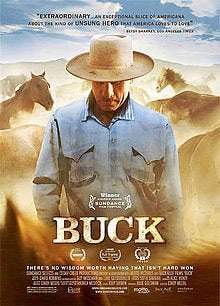IFS Review: "Buck" is a stirring portrait of a true American hero

Film Rating: A-
As some of my readers may know, I am currently a Film and Journalism student at the University of Colorado Boulder. One of the perks of being a film major here is the International Film Series (IFS), the University’s historic art-house series programmed since 1941. It’s been going on for a week or two now, and I’ve only just cleared my schedule enough to start attending films. I’ll be seeing as many of the movies as I can, and reviewing them here on the blog. For more information about the films, showtimes, and locations, visit www.internationalfilmseries.com.
Today I am reviewing the documentary “Buck,” which played a few weeks ago in Denver at the Chez Artiste. Review following after the jump…
Many documentaries take a narrative approach to their subject, fashioning reality into a story with a beginning, middle, and end. Others, often political in nature, are instead a series of talking points meant to convey a particular message. “Buck” is simpler. It merely aspires to paint a portrait of one man, to capture the essence of its subject as wholly yet succinctly as possible. It has no ‘narrative,’ no beginning, middle, and end; as a piece of filmmaking, it breaks no new ground, and is not made to impress with style. It exists only to familiarize the viewer with its subject, and that means that as a work of art, it lives and dies based on the strength of the titular individual.
“Buck” is an amazing film, then, because horse-trainer Buck Brannaman is an astounding figure, a hero if there ever was one. Brannaman – perhaps best known to the American public as the direct inspiration for “The Horse Whisperer” and lead Equine consultant for the film adaptation – is a practitioner of “natural horsemanship,” using non-violent and respectful methods to train and nurture horses. He is one of the most respected and successful horsemen alive today, and spends nine months out of the year travelling the country, visiting various ranches to give four-day clinics on his style of horsemanship. The film includes dozens of testimonials by participants in these clinics who can’t help but sing Buck’s praises, explaining what an immense impact he had on their interactions with horses. It wouldn’t be too much to say that Buck has taken significant steps towards improving the treatment of horses in this country.
That is why I label him a hero: he has devoted his life not just to these horses, but to sharing his unique skill set with as many people as possible; I suspect he’s saved quite a few horses from otherwise harsher existences along the way. Few of us will ever love anything the way Buck loves horses. His respect for these creatures is absolute; he wishes not to command or dominate them, but to create a beneficial partnership. The documentary captures this beautifully by simply filming Buck at work; through the camera we are members of the audience attending one of Buck’s clinics. The film need do nothing special: Buck is doing all the work, and that’s enough to leave us in awe.
Yet a portrait of a man includes more than just his heroics, and “Buck” shines by making us privy to nearly every aspect of the man’s life. We see Buck the family man, a loving father and husband; Buck the ruthlessly efficient traveller; Buck the comedian, often cracking wise in a casual and endearing manner. Buck’s voice is a key component of the film, and his vivid yet understated personality shines through in every frame as he allows us into his life. Others talk about Buck – friends and family and spectators – but we only buy into what wonderful things they have to say about this man because we get to know him as well.
Knowing Buck also means exploring his backstory, particularly his troubled childhood under an abusive father. Though the story is merely told through interviews with Buck and a few others, the film paints one of the most vivid and heartbreaking pictures of child abuse I’ve ever seen. Buck’s scars run deep, and though he asserts that he prefers to live in the moment, it is easy to tell how much his abuse haunts him to this very day. This, perhaps, is the most heroic aspect of Buck Brannaman: that he suffered so much as child but grew up neither angry nor bitter. As Buck himself implies on a few occasions throughout the film, he lives his life with one goal in mind: to treat everyone, from his family to his friends to the horses he trains, with the love and respect he was never granted as a boy.
The brilliance of the documentary lies in its simplicity. As a piece of filmmaking, it is nothing special; there’s some very nice editing work and I was generally impressed by the on-the-fly cinematography, but we’ve all seen similarly assembled documentaries, ones that cut between live footage and talking-head interviews; I feel that this was a deliberate and appropriate choice on part of director Cindy Meehl. Buck, after all, is such an amazing man that no cinematic complexity is needed to convey his genius. That would only get in the way. Instead, Meehl makes sure to capture every element of Buck’s life, personality, and backstory in detail, then assemble it all together without flourish or flab. The result is a lean, comprehensive portrait of Brennaman, one as understated and quiet as the man himself, and just as inspiring for it.

